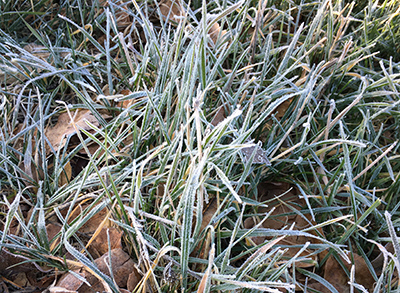Freeze alert tips
Take precautions to prevent water pipes from freezing when the temperature drops below freezing
If Your Pipes Freeze or Burst:
Don’t take chances. If you turn on your faucets and nothing comes out, call Templeton CSD at (805) 434-4900.
If you detect that your water pipes have frozen and burst, turn off the water at the main shut-off valve in the house. (Make sure everyone in your family knows where the water shut-off valve is and how to open and close it.)
Your shut-off valve is typically located directly opposite the water meter where the service line enters your house. Normally the shut-off valve is near the perimeter of your house, often close to a water faucet or spigot.
Never try to thaw a pipe with a torch or other open flame. Water damage is preferable to burning down your house. You may be able to thaw a frozen pipe with the warm air from a hairdryer. Start by warming the pipe as close to the faucet as possible, working toward the coldest section of pipe.
Never use electrical appliances in areas of standing water because you could be electrocuted.
If you are unable to shut off your water at the valve to your house, call Templeton CSD at 434-4900 and a Water Maintenance Worker will respond and turn off the water at the meter.
Before the Cold Hits:
Exposed pipes can freeze and burst when the air temperature reaches below-freezing (32 degrees F). The water pipe between the water meter and your home or property is often the most vulnerable to freezing conditions and therefore should be wrapped with foam insulation. You may also need to insulate your water pipes in the attic and basement, depending on how well those areas of your home are insulated. Foam insulation is available at most hardware stores and can be easily secured using electrical tape or copper wire. Insulate pipes in your home’s crawl spaces and attic. These exposed pipes are most susceptible to freezing. Remember: The more insulation you use, the better protected your pipes will be.
Seal leaks that allow cold air inside, near where pipes are located. Look for air leaks around electrical wiring, dryer vents and pipes. Use caulk or insulation to keep the cold out and the heat in. With severe cold, a tiny opening can let enough cold air to cause a pipe to freeze.
Disconnect garden hoses and, if practical, use an indoor valve shut-off and drain water from pipes leading to outside faucets. This reduces the chance of freezing in the short span of pipe just inside the house. Irrigation: To prevent your irrigation pipes from freezing, drain the water from any exposed irrigation water pipes and, as an extra precaution, cover those exposed sections with foam insulation.
When the Mercury Drops:
A trickle of hot or cold water might be all it takes to keep your pipes from freezing. Let warm water drip overnight, preferably from a faucet on an outside wall. Open cabinet doors to allow heat to get to un-insulated pipes under sinks and appliances near exterior walls.
If You’re Away:
Set the thermostat in your house no lower than 55 degrees (12 degrees Celsius). DO NOT TURN YOUR HEATER OFF. We have had residents come home to broken pipes and water damage due to turning their heater off while they were gone on vacation…
Ask a friend or neighbor to check your house daily to make sure it’s warm enough to prevent freezing, or …
Shut off and drain the water system. Be aware that if you have a fire protection sprinkler system in your house, it will be deactivated when you shut off the water.










